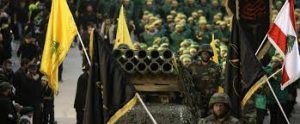The Lebanese Iranian proxy Hezbollah is once again stirring up tensions with Israel but is stopping short of triggering a wide-scale military confrontation with the Israeli military, like reported by inn.com.
Some think this has something to do with the Corona crisis that has hit Iran very hard and is currently also the only subject that interests the average Israeli citizen.
However, as we will see, Iran has not stopped its aggressive drive to create a Shiite Crescent in the Levant, covering area stretching from northern Iraq, Syria, Lebanon, and parts of Israel. It also continues to provoke the US Navy in the Persian Gulf.
Just a few days after Hezbollah’s Deputy Secretary-General Sheikh Na’im Qassem said his organization is fully prepared for a new war with Israel, a couple of incidents occurred that indicated the sides are not actually interested in a full-blown confrontation.
This, despite Qassem’s declaration that Hezbollah has prepared itself for any confrontation with Israel, including a total war.
The current flare-up in the area of the Israeli Lebanese border actually started on March 26 when the Israeli military shot down a drone that entered Israel from Lebanon.
Hezbollah didn’t react to the downing of the drone but continued its belligerent activities in both Lebanon and Syria where the terror organization is doing Iran’s bidding by building up forces on the Syrian side of the Golan Heights.
In this respect, the Israeli Defense Forces (IDF) apparently wanted to convey a message to Hezbollah and Iran.
On April 10th, the IDF released footage of a meeting between a Syrian top commander and Hezbollah operative Hajj Hashem who is responsible for the build-up of troops on the Syrian Golan Heights.
“Look closely. See the man with white hair? That’s the head of the Syrian Armed Forces 1st Corps, Luau Ali Ahmad Assad. He’s visiting Hezbollah’s positions in Syria.
“Our message: We see you. Consider this a warning. We won’t allow Hezbollah to entrench itself militarily in Syria,” the IDF said in a statement that was published on Twitter.
On April 15, the IDF made good on its promise to deny Hezbollah the chance of entrenching itself militarily in Syria and attacked a Hezbollah jeep full of terrorists, one of them Mustafa Mughniyeh, the son of Imad Mughniyeh, Hezbollah’s former terror mastermind assassinated by the Mossad and the CIA in 2008.
A closer look at the footage of the strike that was published by the Iranians (sic) showed that it wasn’t a botched attempt to assassinate Mustafa Mugniyeh, as the media reported it to be, but a psychological blow to Hezbollah and Iran: the IDF indeed ‘sees’ what the axis is doing in Lebanon and Syria.
The footage of the strike, that reportedly was carried out by an Israeli drone begins after a first missile was fired at the Jeep but didn’t hit the vehicle something that is rare for a drone attack.
Three Hezbollah operatives can be seen running from the car but then they apparently remember that they forgot to take important luggage from the car and return to the vehicle.
The drone kept the car in its sights all the time but only released a second missile destroying the Jeep after the Hezbollah men had taken out the bags and disappeared.
The whole operation reminded one of the video the IDF released on the day it began a long operation against Hezbollah’s terror tunnels underneath the Israeli border.
In that video, which was made by a camera that the IDF placed in one of the tunnels by using a robot, a Hezbollah operative could be seen approaching the camera after which a small bomb was detonated which scared the man away.
The message there was also to humiliate Hezbollah, which had been working on the tunnel project for more than a decade with the help of the Iranians and engineers from North Korea.
Hezbollah now faced a dilemma. It had to respond in order to deter Israel’s military, but didn’t want to risk an all-out war like the one in 2006, which broke out the Hezbollah leader miscalculated and triggered the Second Lebanon War after attacking IDF Jeeps within Israeli territory and killing the crews.
It came therefore as no surprise that the IDF reported another incident involving Hezbollah on Friday.
The Israeli military reported that the Lebanese terror organization had damaged the electronic security fence in three different locations along the Israeli border but had not attempted to infiltrate Israel.
The message here was also clear: we can launch infiltrations at any moment of our choosing.
“IDF inspections revealed damage to the fence at three locations. Maintenance crews are currently repairing the damage. The circumstances will be investigated, yet it is clear that no breach of Israeli territory occurred,” the Israeli army said in a statement.
Lebanese media, including Hezbollah’s Al-Manar outlet, later reported that the IDF had used a robot to drag two blue nylon bags with “bodies” into Israel and shot bullets at a third.
On Sunday, Lebanese media reported IDF forces were still combing the area along the Lebanese border using smokescreens to hide their activities.
This all adds up to show that Hezbollah, despite a huge internal financial, humanitarian and health crisis in Lebanon, continues Iran’s Israel project.
The Islamist regime in Tehran will never stop its drive to take over the Middle East, as the current Corona crisis makes clear.
With hospital staffs in the Islamic Republic collapsing under the pressure of one of the worst COVID-19 outbreaks in the world, the regime stubbornly continues its aggressive policies against its foes, Israel and the United States, while denying the Corona crisis.
Converted speedboats of the Islamic Revolutionary Guards Corps are now provoking US warships in the Persian Gulf on a daily basis and risk a major confrontation with the US military.



